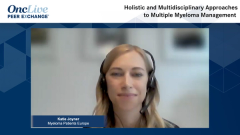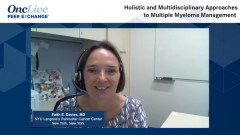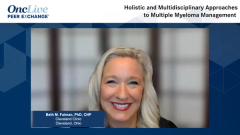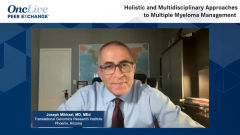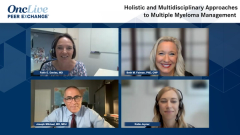
Educating Patients on Treatment Options for Multiple Myeloma
Expert panelists consider best methods in educating patients on their options for therapy following a diagnosis of multiple myeloma.
Episodes in this series

Transcript:
Faith E. Davies, MD: And Beth, maybe, just a little bit about … education about treatment options. How do we best include our patients and their families in those kinds of discussions?
Beth M. Faiman, PhD, CNP: I mentioned before, as much as I try to have [those], Katie brought up the excellent point, that not everybody has access to all of the same therapies everywhere. Canada, Australia, Europe, everybody’s different. But if you do have a choice, then ... we have a frank discussion about is it 2, 3, or 4 drugs? What are the financial implications of accessing those drugs? … More often I’m seeing these days that reimbursement for certain drugs [isn’t] necessarily as good as [it was] before. And so, having a discussion, what [do] your financial resources look like? Are there support services where you can have assistance with co-payment for those medications? So … we talked about the physical, the financial, and the social barriers and overcoming those barriers. And so, education about the types of medications, what are the side effects, having them buy into the therapy you’re recommending will help with the adherence to therapy. It’ll decrease decisional regret … maybe I didn’t make the right decision for me and my family.
Also, again, financial, it could be as easy as co-payments for visits. And so, the different structure globally might play into this. But in the US and parts of Canada as well, in North America, there is a large co-payment for just simple services sometimes. And then, really looking towards support groups. And I know I said that before and ... Katie and Joe and you will agree with me, finding peers that are going through this as well through so many different virtual avenues is important because they can run side effects off of each other. They can find valuable resources that they can buy into, and then sometimes build up little networks. I know in my area I have a group [where] they help each other. They’ll go shopping for food or bring them something if they’re not feeling well or take them to an office visit. And so that’s very valuable. It’s not for everyone. But those are some of the things in terms of the education of not only the disease education, the side effect education of what they just decide upon, but also the ways you can overcome some of the barriers in terms of access to care.
Faith E. Davies, MD: I was going to say, there [are] so many aspects to access to care, isn’t there? And as you can tell from a European who’s transplanted over to the US, it’s very interesting to me trying to understand the insurance system about the difference between intravenous drugs and oral drugs and how many patients may struggle … with the co-pay for oral drugs. And then the greater … differences between the availability of bispecifics and the availability of CAR T cells. And ... those new therapies that are coming along are certainly adding a new stress to the system.
And ... Joe mentioned it a little bit earlier about the … different patients [who] are entered into clinical trials. And we know that for many clinical trials, many of our underserved patient population is, unfortunately, not in those clinical trials, be it because they maybe don’t meet the entry criteria because of their renal function or indeed just because they’re never offered the clinical trial. Or, it may be expensive to travel back and forth [to] the clinical trial. So ... there [are] all sorts of different aspects to this. And I guess I wanted to chat with Katie a little bit. Within your role for MPE [Myeloma Patients Europe], how are you helping … the different European countries think about those disparities and accessing care?
Katie Joyner: So ... similar to what Beth mentioned, there [are] so many avenues to educate patients and their families around options. And so, we put a lot of efforts into educational resources, again, translated and written in patient-friendly ways so that we can provide up-to-date, accurate, and patient-friendly information for them to have an informed conversation with their health care provider. Similar to what Joe was mentioning … the cultural competencies around care, you see significant differences in Europe, as well as with the United States, but you have cultures that are very much aligned with listening to the doctor, not necessarily questioning that or looking for a second opinion or very informed and empowered patients who really spend a lot of time informing themselves about their disease and treatment options and going to the doctor maybe with some potential suggestions. So, we just want to make sure that we provide as much information as possible.
And we also recognize that some patients don’t want to spend … all their free time learning about myeloma and all of the different options for them. Of course, we know that more informed patients typically have better outcomes, but we want to make it as easy and digestible for them and meet them where they want to be informed. And ... something that we’re seeing more recently … within the scope of support groups [is] finding the right group for the right patients. So, as more younger patients are diagnosed, patients who are still working, are raising children, finding the right patients to connect to [and] have those conversations as it’s shifting … Of course, it’s still a disease that is mostly in patients 70+ [years old]. But we have a lot more, unfortunately, younger patients who have different needs and they want to connect with patients around those needs. And then also with some of the newer treatments coming out, we’re getting a lot of questions around the actual experience of going through CAR T, what these new side effects look like with bispecifics. And so more … patient-to-patient information of, this was my experience going through a treatment that very few patients understand. So, providing … new ways of patients to connect with each other and understand what that looks like for them.
Transcript is AI-generated and edited for clarity and readability.


